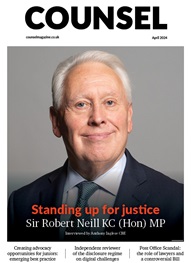*/
THE Bar Council has today welcomed the publication of the Wood Report on the Bar Vocational Course (BVC), which was produced by a Working Group chaired by Derek Wood QC. The report and its recommendations will now be considered by the Bar Standards Board (BSB). The report has taken into consideration the Bar Council report on the BVC by Richard Wilson QC (published in April 2008), as well as Lord Neuberger of Abbotsbury’s report on access to the Bar, published in November 2007.
Submitted to the Bar Standards Board, which validates and monitors BVC providers, the Wood Report has recommended a variety of changes to the course. These recommendations include an increased focus on professional ethics, advocacy and dispute resolution and the introduction of an aptitude test for those applying to take the course. In addition, the Wood Report has recommended that centrally set and marked examinations be introduced which would be overseen by a BSB-established Board of Examiners.
Commenting on the report, Duncan Matthews QC, Chairman of the Bar Council's Neuberger Monitoring and Implementation Group, said:
"We are grateful to Derek Wood QC and his team for the timely delivery of this report and for giving careful consideration to LordNeuberger's recommendations. The Monitoring and Implementation group will examine it closely in the coming weeks and make further representations as appropriate to ensure that entry to the Bar is and is seen to be on merit alone."
Submitted to the Bar Standards Board, which validates and monitors BVC providers, the Wood Report has recommended a variety of changes to the course. These recommendations include an increased focus on professional ethics, advocacy and dispute resolution and the introduction of an aptitude test for those applying to take the course. In addition, the Wood Report has recommended that centrally set and marked examinations be introduced which would be overseen by a BSB-established Board of Examiners.
Commenting on the report, Duncan Matthews QC, Chairman of the Bar Council's Neuberger Monitoring and Implementation Group, said:
"We are grateful to Derek Wood QC and his team for the timely delivery of this report and for giving careful consideration to LordNeuberger's recommendations. The Monitoring and Implementation group will examine it closely in the coming weeks and make further representations as appropriate to ensure that entry to the Bar is and is seen to be on merit alone."
THE Bar Council has today welcomed the publication of the Wood Report on the Bar Vocational Course (BVC), which was produced by a Working Group chaired by Derek Wood QC. The report and its recommendations will now be considered by the Bar Standards Board (BSB). The report has taken into consideration the Bar Council report on the BVC by Richard Wilson QC (published in April 2008), as well as Lord Neuberger of Abbotsbury’s report on access to the Bar, published in November 2007.


Sam Townend KC explains the Bar Council’s efforts towards ensuring a bright future for the profession
Giovanni D’Avola explores the issue of over-citation of unreported cases and the ‘added value’ elements of a law report
Louise Crush explores the key points and opportunities for tax efficiency
Westgate Wealth Management Ltd is a Partner Practice of FTSE 100 company St. James’s Place – one of the top UK Wealth Management firms. We offer a holistic service of distinct quality, integrity, and excellence with the aim to build a professional and valuable relationship with our clients, helping to provide them with security now, prosperity in the future and the highest standard of service in all of our dealings.
Is now the time to review your financial position, having reached a career milestone? asks Louise Crush
If you were to host a dinner party with 10 guests, and you asked them to explain what financial planning is and how it differs to financial advice, you’d receive 10 different answers. The variety of answers highlights the ongoing need to clarify and promote the value of financial planning.
Most of us like to think we would risk our career in order to meet our ethical obligations, so why have so many lawyers failed to hold the line? asks Flora Page
If your current practice environment is bringing you down, seek a new one. However daunting the change, it will be worth it, says Anon Barrister
Creating advocacy opportunities for juniors is now the expectation but not always easy to put into effect. Tom Mitcheson KC distils developing best practice from the Patents Court initiative already bearing fruit
Sam Townend KC explains the Bar Council’s efforts towards ensuring a bright future for the profession
National courts are now running the bulk of the world’s war crimes cases and corporate prosecutions are part of this growing trend, reports Chris Stephen